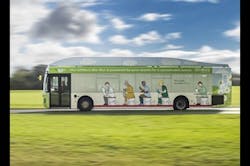UK’s First Biomethane Bus to Operate in Bristol
The UK’s first bus powered by human waste is to be used regularly in service in Bristol from 25 March 2015 with the 32,674 households* along the route of Service 2 in the city helping (indirectly) to fuel it.
In running the Bio-Bus in the city, operators First West of England will be able to assess how well the vehicle – powered by biomethane gas – copes with the demand of a city-wide operation, and how the general public react to it.
Biomethane gas is a sustainable fuel source and if the trial with the Bio-Bus proves successful here, First West of England will look to possibly bring more Bio-Buses into operation in the future. Much of that decision rests though on the success of the trial, and the public’s response to the vehicle itself.
Fuelling the Bio-Bus in Bristol is one of the challenges that First will have to overcome while it is running the vehicle. While the rest of its fleet can be fuelled in its depots, for the duration of the trial the Bio-Bus will need to fill up at a special site in Avonmouth, where GENeco, the renewable energy and waste recycling company owned by Wessex Water, turns sewage and inedible food waste into the biomethane gas. If the trial is successful then as part of a further rollout of vehicles, First would need to find a way to fuel the buses within its depot facilities.
For the duration of the trial all the households along the route used by the Bio-Bus (Service 2) will, indirectly, help to fuel it. These households have their waste processed at Bristol sewage treatment works at Avonmouth.
Over the course of each month, it is thought that each household along the route of Service 2 would contribute enough waste to fuel the Bio-Bus for 10.5km (6.5miles). The route of Service 2 is around 15 miles in each direction, meaning it would take each household around two months to produce enough waste to fuel an end-to-end journey on it. Collectively though, all the households along the route could produce enough waste over the course of a year to run the Bio-Bus for 4.1million kilometres (2.5 million miles).
It will begin operating in the city a week later, duplicating set journeys on First West of England’s Service 2 on Wednesdays, Thursdays, Fridays and Saturdays*. The exact detail of which journeys the bus will operate on will be published in advance on First’s local website (www.firstgroup.com/biobus).
Talking about the Bio-Bus, and the company’s plans to operate it in the city, James Freeman, Managing Director of First West of England says; “Since its original unveiling last year the Bio-Bus has generated worldwide attention and so it’s our great privilege to bring it to the city, to operate – quite rightly – on Service 2.
“The Bio-Bus previously made an appearance running between Bath and Bristol Airport at the end of last year, but it’s only actually been used once before in the centre of Bristol itself. That was on the official launch weekend of the Bristol Green Capital year – when we ran free round-trip journeys on it. From its first outing though it’s turned heads, and we expect interest in this vehicle to be maintained for the entire time we have it.
“From 25 March we’ll be running the Bio-Bus on a set schedule for four days a week.
“The very fact that its running in the city should help to open up a serious debate about how buses are best fuelled, and what is good for the environment. In this Bristol Green Capital year that conversation is more welcome than ever.”
The Bio-Bus can set up to 40 people, with space for one wheelchair. It is powered by biomethane gas produced from food and sewage waste by GENeco, a subsidiary of Wessex Water. The Bio-Bus helps to improve urban air quality as it produces fewer emissions than traditional diesel engines.
